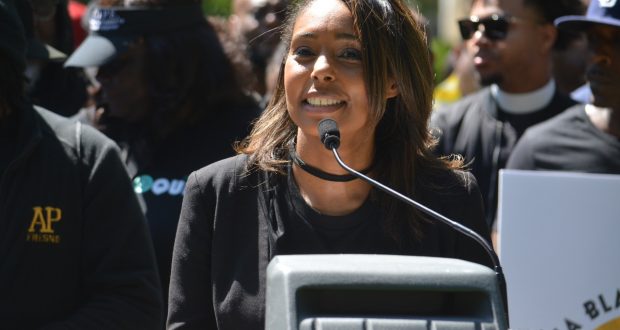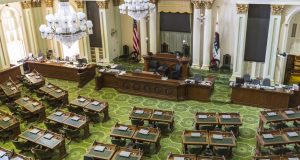By Edward Henderson, California Black Media
The Black Equity Collective (BEC) is a community-focused, public-private partnership with Black equity as its central, driving force.
BEC’s focus is to strengthen the long-term capacity and infrastructure of Black-led social justice organizations in Southern California.
Born out of two organizations – the Social Good Solutions Firm and the Black Equity Initiative — BEC’s mission is centered on the belief that progress on Black equity and racial justice must be part of any credible social justice movement in the United States. Additionally, the collective believes equity is only achieved when philanthropic investments, public policies, and institutional practices converge to boldly confront racial injustice.
Kaci Peterson, the founder and Chief Architect of Social Good Solutions and the Black Equity Collective, has over 18 years of experience in the non-profit and philanthropy sectors, managing several multi-million-dollar grant-making portfolios.
California Black Media (CBM) spoke with Peterson recently. She discussed the organization’s successes, disappointments, and lessons from 2024 as they continue their initiatives into the new year.
Responses have been edited for length and clarity.
Looking back at 2024, what stands out to you as your most important achievement and why?
This year, we celebrated our 10-year anniversary as a firm. Since the firm’ s inception we are proud to announce that cumulatively we’ve been able to raise and leverage over $55.5 million for Black-led organizations in California.
How did your leadership and investments contribute to improving the lives of Black Californians?
We launched a survey involving 200 Black-led organizations to study the economic impact of Black-led organizations on California’ s GDP. The results of that survey will be released in early 2025. One of the reasons that survey is important is that it develops a narrative around why there is severe underinvestment in Black-led organizations.
What frustrated you the most over the last year?
The decline in philanthropic investment after the height of commitments following the murder of George Floyd, following COVID. There was really this opportunity for philanthropy to permanently shift course and take a different approach when it comes to Black-led organizations.
While some have, for the most part, philanthropy has retreated to a place of familiarity, which is pulling back on their funding.
What inspired you the most over the last year?
I am always inspired by the leaders on the ground who just continue to do monumental work. The fact that here in Los Angeles, we’ve been able to stand up a doula hub in response to the policy advocacy work that so many of our leaders, our Black women in particular, really pushed and got state legislation passed a couple of years ago so that doulas can be an approved and reimbursable expense through Medi-Cal. There has been a real push to make the implementation of that law real.
I’m proud of the collaboration that we’ve been able to do with other Black-led networks across the state.
What is one lesson you learned in 2024 that will inform your decision-making next year?
I started an 11-week sabbatical on Nov. 1. I think oftentimes as Black leaders, we are burning the candle at both ends. And I don’ t think Black people are even aware of the social, emotional, and physical toll that taken on us — even subconsciously. We must really see, rest, retreat and take respite as part of our journey to justice.
In one word, what is the biggest challenge Black Californians face?
Erasure.
We’ve really leaned into a narrative of Black permanence and what it means to preserve our community, our culture, our contributions, our language, our history, our leaders, our institutions. There is so much effort to erase us through burnout and fatigue, through underfunding of our organizations. To erase our history by banning books and not allowing certain things to be talked about.
We must have a counter battle.
What is the goal you want to achieve most in 2025?
I really want to start up an endowment for the collective. I think it’s really important to be able to preserve all of the things that the collective has contributed to the ecosystem so far — the philanthropic ecosystem in particular. To be able to create and establish an endowment for the collective that allows that work to happen in perpetuity is really important.
 Westside Story Newspaper – Online The News of The Empire – Sharing the Quest for Excellence
Westside Story Newspaper – Online The News of The Empire – Sharing the Quest for Excellence





